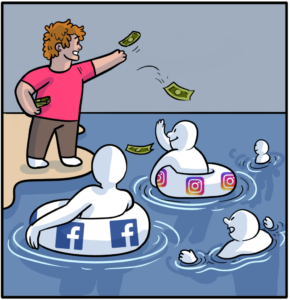The staff editorial is the majority opinion of The Murray State News Editorial Board.

The past decade has been defined by advances in technology and the burgeoning growth of the internet. Many of our wants, and some immediate needs, can be met by using an app or other online service.
And although the Millennial generation is often regarded as too dependent on these new conveniences, they have afforded us a unique opportunity those before us never had: the ability to donate and influence change with only our fingertips.
Online crowdfunding and other internet services have proved an invaluable resource for charity and relief efforts. Prior to widespread internet access, awareness of and response to natural disasters wasn’t as instantaneous as it is now. Telethons and benefit dinners can’t compare to the power of modern crowdfunding.
The American Red Cross and other philanthropic organizations have taken notice. Utilizing these services to bolster relief efforts has proved an invaluable way to provide individuals who may not have the time or means to contribute in a meaningful way. Those with disabilities or mental illnesses may also find new confidence in their ability to contribute to or spread awareness of these efforts.
Not everyone is content with these changes, though.
A fair criticism of this is that some are perhaps less motivated to contribute than ever before, despite having more opportunities to do so. It’s now easier for one to simply say they support a cause via Facebook status as opposed to donating or volunteering.
This trend has been dubbed “slacktivism.” No real effort is required to say you support something and the social or economic change which comes from one doing so may be negligible.
Some argue it’s a valuable form of activism all of its own, as this spreads awareness of the issues. Either way, it has become clear there is more than one right way to make a difference, and while critique of any major shift is important, we must do so in a constructive way which doesn’t alienate those who are contributing how they are able.
Of course, the benefits of new crowdfunding efforts aren’t only applicable to disaster relief.
Patreon, Kickstarter and GoFundMe are popular crowdfunding websites which have revolutionized how we support others.
It’s common nowadays for artists, travelers and technology developers to look to the general public to fund their ventures, typically with some kind of reward given to backers as they meet certain goals. This is a growing practice within the online entertainment industry, with many content creators relying on their viewers to support their content.
So could this mean we are becoming a more giving and charitable society? Maybe. If nothing else, the internet has proved an invaluable way to support and spread awareness of social and economic causes.
But there may be underlying issues not addressed by this practice.
Some are using these sites to pay for outrageous medical expenses or college tuition. While these individuals may receive assistance, how will this help to resolve the cause of these sky-high costs?
Crowdfunding can’t initiate legislation, but it’s certainly a conversation starter. Maybe as more people resort to these means, others may feel empowered to speak about their struggles, and this increased awareness may be what’s needed to spark change.
We can only hope future generations will continue to embrace and build upon the opportunities afforded to us by advances in technology.





























































































